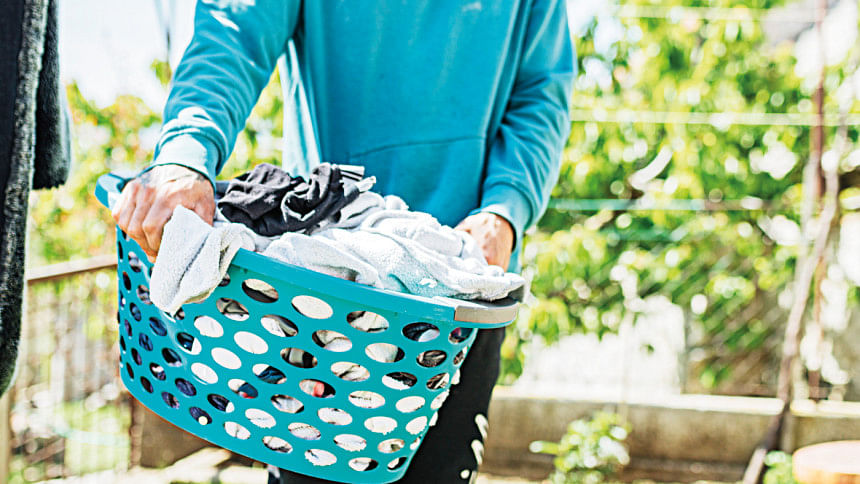Deconstructing the mental load of laundry

"Ma, how does the washing machine know if the clothes are dirty?"
My six-year-old nephew's question made everyone in the room laugh but it stayed with me. To him, the machine wasn't something his mother used because she was a woman; it was simply a fascinating gadget. Watching him reminded me how easily children absorb the world around them and how quickly play turns into perception.
Growing up, we all played "house." Girls wrapped saris, swept imaginary floors, stirred invisible rice, and scrubbed tiny socks in plastic basins. Boys slung on fake ties, carried cardboard briefcases, and returned home from pretend offices; sometimes calling out for tea. Rarely, if ever, did a boy wash clothes, even in play. We weren't taught these roles outright; we learned them by watching. Laundry, messy and time-consuming, was quietly assigned to women. Never questioned, never shared.
But today, that old story is slowly unraveling.
That subtle shift says a lot about how gender roles are evolving, slowly but surely, and how smart household appliances, especially washing machines, can be unexpected agents of change.
In many Bangladeshi homes, however, laundry still carries the invisible weight of gender. Despite increasing urbanisation and dual-income households, the burden of household chores disproportionately falls on women. But as modern life gets busier and smart appliances get smarter, the old "division of labour" is being questioned. Today, a washing machine isn't just a box that spins clothes. It's a bridge between gendered expectations and shared responsibility.

No learning curves needed
One of the biggest psychological hurdles for men stepping into household chores is the idea that they might "get it wrong." Operating a washing machine, with its buttons, dials, and multiple cycles, once felt like a puzzle best left to the "experts" at home, usually women.
But that's changing. Companies like Walton, Jamuna and Singer are designing machines that require little to no learning curve, making it easier for anyone to do laundry, regardless of experience or gender.
"Even for users unfamiliar with laundry tasks, features like fuzzy logic and auto-dosing in Walton machines make washing clothes as simple as pressing a button," said Fazle Rabbi Khadem, Senior Brand Manager for Walton Home & Kitchen Appliance. With fuzzy logic, the machine automatically detects the load size and fabric type, adjusting water and detergent levels accordingly.
Meanwhile, Jamuna's all-in-one washer-dryer and auto-diagnosis system take convenience to the next level. "Jamuna machines are built to eliminate confusion. You don't need to be a pro. The machine figures out the settings for you," said Salim Ullah Salim, Marketing Manager at Jamuna Group.
The rise of inclusive design
Washing machines today come with minimalist displays, quick-start guides, and preset programs tailored for everyday needs. Some even connect to apps for real-time support or alerts. But more importantly, they're designed to be gender neutral.
The current washing machine designs cater to a broader demographic, focusing on functionality over flair. And while their marketing still leans heavily on the idea of "smart homemakers," the machines themselves are quietly encouraging a cultural shift, empowering anyone in the family to take part in household care.
Walton's latest washing machines are equipped with AI-based load sensing and smart control panels, designed with minimal buttons and easy-to-understand icons. Some even come with child-lock and noise-reduction technology, reflecting a design philosophy that considers the user's lifestyle holistically. For men who are newly stepping into shared domestic roles or bachelors learning to manage on their own, these features remove the intimidation factor and make laundry just another part of the routine. "For new users, all of our machines come with easy-to-read manuals as well as several tutorial videos which makes everything smooth for everyone," shares Fazle Rabby from Walton.
Singer Bangladesh, one of the oldest and most trusted names in home appliances, has also evolved with the times. Their washing machines now offer mobile app connectivity, self-cleaning features, and auto restart functions which are ideal for users who might get interrupted mid-task.
What's particularly notable is how these innovations are not just adding convenience, they're changing perceptions. When machines are intuitive and smart, the 'mental load' of doing laundry no longer rests on just one person. With programmable settings, Wi-Fi-enabled controls, and clear interfaces, washing clothes doesn't require prior expertise or even physical presence. Whether it's a father washing baby clothes, a teenage boy helping with weekend chores, or a husband taking on equal responsibility, the act itself is no longer gendered. It's just a task, easily shared.
If my nephew's curiosity is anything to go by, the next generation may not carry the same baggage. For them, a washing machine will just be what it is, a machine. Not a symbol of gender roles. And that's a wash cycle worth celebrating.

 For all latest news, follow The Daily Star's Google News channel.
For all latest news, follow The Daily Star's Google News channel. 



Comments